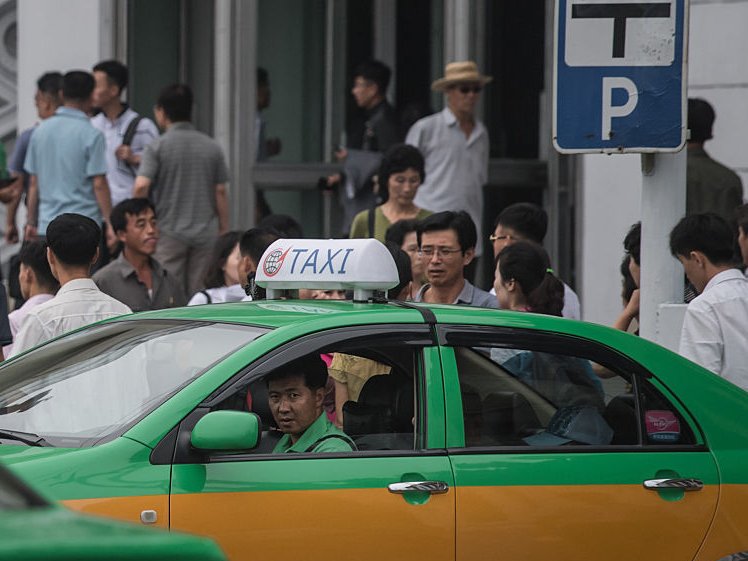
A
taxi waits for customers as pedestrians make their way past the
central railway station in Pyongyang on July 10,
2016.
ED JONES/AFP/Getty
Images
On-demand taxis are gaining traction in North
Korea.
This popularity is driven by the country’s growing
consumer class.
In turn, taxis have become highly lucrative and being a
driver is one of the country’s most sought after jobs.
On-demand taxis are gaining popularity among wealthier customers
across North Korea.
According to
Daily NK, a Seoul-based news site staffed by North Korean
defector journalists, customers can summon North Korean taxis
with a phone call, and one should arrive within 10 minutes no
matter the time, day or night.
“Wealthier individuals in the city like to summon a taxi right to
their doorstep on special occasions like holidays and birthdays,
which then take them to their favorite restaurant, for example,”
a source in Pyongsong told Daily NK.
Customers pay a base price of $1 to $2. The rate is three times
more than a standard cab and far more than average North Korean
workers earning $4 a day can
afford.
Plus, some “call taxi” drivers only accept US dollars and Chinese
yuan.
Given their high cost and need for foreign currency, the best
explanation for the popularity of “call taxis” amongst locals is
for North Korea’s
“consumer class” to be growing.
North Korea’s taxi market is highly lucrative
The potential income from taxis is significant in North Korea,
and the competition between companies is fierce.
In previous years, both private and government drivers hired
part-time
‘shepherds’ who would go out and find customers for them.
These shepherds could earn up to $50 a day by working for a
driver, indicating drivers are earning many times that amount.
Even drivers for state-run taxi companies get to keep all their
earning beyond a daily fee.
Given the ability to earn foreign currency while doing a
relatively comfortable job, being a taxi driver has quickly
become one of North Korea’s most
popular jobs.
Potential workers are even paying bribes to secure a driver job,
according to Radio
Free Asia.
A number of North Korean businesses have launched taxi services

Taxis
are parked outside a department store in central Pyongyang, North
Korea May 4, 2016.
REUTERS/Damir
Sagolj/File photo
The market for taxis has grown so large in North Korea that
several businesses aimed at middle class and wealthy North
Koreans have diversified into the market.
In
2014, The Daedong River Passenger Transport Company launched
its own service asking residents to call ‘186’ for a taxi.
In 2015, state airline Air Koryo launched a
taxi service with cars, minivans, and SUVs.
And the following year the Mirim Horse Riding Club, which offers
gambling and charges locals a hefty
$10 to use its luxury facilities,
launched its own taxi service.
“It seems like everyone’s doing it,” Rowan Beard, a tour guide
from the Young Pioneer Tours company, told
NK News at the time. “Mirim have a good brand name and
represent a finer class of Koreans.”
The $35 million Masikryong Ski Resort also has its own taxi
company.
